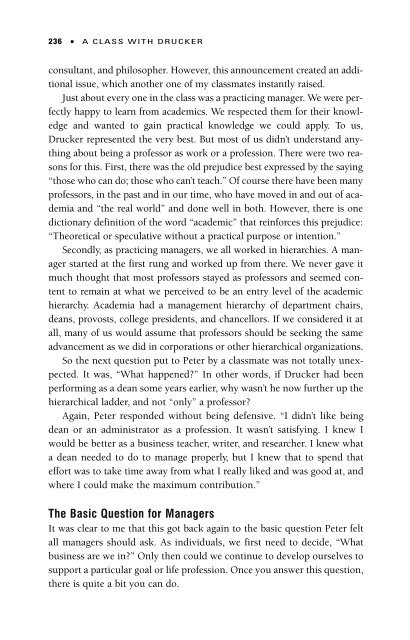A Class with Drucker - Headway | Work on yourself
A Class with Drucker - Headway | Work on yourself
A Class with Drucker - Headway | Work on yourself
Create successful ePaper yourself
Turn your PDF publications into a flip-book with our unique Google optimized e-Paper software.
236 ■ A CLASS WITH DRUCKER<br />
c<strong>on</strong>sultant, and philosopher. However, this announcement created an additi<strong>on</strong>al<br />
issue, which another <strong>on</strong>e of my classmates instantly raised.<br />
Just about every <strong>on</strong>e in the class was a practicing manager. We were perfectly<br />
happy to learn from academics. We respected them for their knowledge<br />
and wanted to gain practical knowledge we could apply. To us,<br />
<str<strong>on</strong>g>Drucker</str<strong>on</strong>g> represented the very best. But most of us didn’t understand anything<br />
about being a professor as work or a professi<strong>on</strong>. There were two reas<strong>on</strong>s<br />
for this. First, there was the old prejudice best expressed by the saying<br />
“those who can do; those who can’t teach.” Of course there have been many<br />
professors, in the past and in our time, who have moved in and out of academia<br />
and “the real world” and d<strong>on</strong>e well in both. However, there is <strong>on</strong>e<br />
dicti<strong>on</strong>ary definiti<strong>on</strong> of the word “academic” that reinforces this prejudice:<br />
“Theoretical or speculative <str<strong>on</strong>g>with</str<strong>on</strong>g>out a practical purpose or intenti<strong>on</strong>.”<br />
Sec<strong>on</strong>dly, as practicing managers, we all worked in hierarchies. A manager<br />
started at the first rung and worked up from there. We never gave it<br />
much thought that most professors stayed as professors and seemed c<strong>on</strong>tent<br />
to remain at what we perceived to be an entry level of the academic<br />
hierarchy. Academia had a management hierarchy of department chairs,<br />
deans, provosts, college presidents, and chancellors. If we c<strong>on</strong>sidered it at<br />
all, many of us would assume that professors should be seeking the same<br />
advancement as we did in corporati<strong>on</strong>s or other hierarchical organizati<strong>on</strong>s.<br />
So the next questi<strong>on</strong> put to Peter by a classmate was not totally unexpected.<br />
It was, “What happened?” In other words, if <str<strong>on</strong>g>Drucker</str<strong>on</strong>g> had been<br />
performing as a dean some years earlier, why wasn’t he now further up the<br />
hierarchical ladder, and not “<strong>on</strong>ly” a professor?<br />
Again, Peter resp<strong>on</strong>ded <str<strong>on</strong>g>with</str<strong>on</strong>g>out being defensive. “I didn’t like being<br />
dean or an administrator as a professi<strong>on</strong>. It wasn’t satisfying. I knew I<br />
would be better as a business teacher, writer, and researcher. I knew what<br />
a dean needed to do to manage properly, but I knew that to spend that<br />
effort was to take time away from what I really liked and was good at, and<br />
where I could make the maximum c<strong>on</strong>tributi<strong>on</strong>.”<br />
The Basic Questi<strong>on</strong> for Managers<br />
It was clear to me that this got back again to the basic questi<strong>on</strong> Peter felt<br />
all managers should ask. As individuals, we first need to decide, “What<br />
business are we in?” Only then could we c<strong>on</strong>tinue to develop ourselves to<br />
support a particular goal or life professi<strong>on</strong>. Once you answer this questi<strong>on</strong>,<br />
there is quite a bit you can do.


